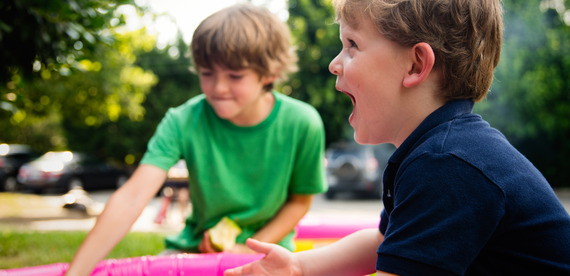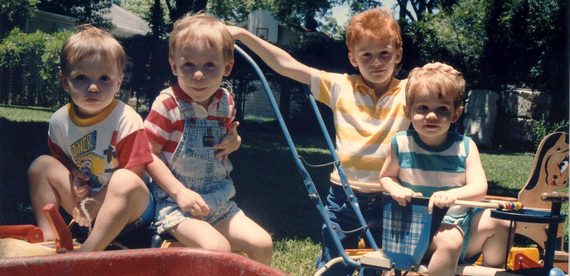Your New Life Overseas With Kids
The advantages to raising children abroad are many, from a second (or even third) language to a second passport. Children raised overseas are generally self-confident, open-minded, and resourceful. They learn to make friends easily and to adjust and to adapt quickly.
If you're hesitating making an international move because you have children, you're making a mistake.
That, however, is not to say that raising kids in another country is easy.
When you make a move overseas with children, they, specifically the options for their education, become your priority. Moving with children also means that you must move full-time or at least that you must schedule your part-time life in your chosen haven around their school calendar.
My daughter Kaitlin, age 8 at the time, cried herself to sleep every night during our first year living in Waterford. She was fiercely opposed to the idea of leaving her grandmother, her cousins, her friends, and her school in Baltimore behind, and she made sure we were painfully aware of that fact every single day.
"You've ruined my life!" she sobbed night after night as she fled from the dinner table to her bedroom and slammed the door.
My husband Lief and I thought we were doing precisely the opposite. We believed we were enriching Kaitlin's life and expanding her horizons. But, I have to admit, some nights I'd lie awake wondering if maybe Kaitlin weren't right. Maybe launching a new life in a foreign country at age 8 would translate into years of psychotherapy down the road.
Our first year in Paris it was Kaitlin's little brother Jackson, age 4 at the time, born in Ireland, who struggled through the transition.
"Give him six weeks," his preschool teacher advised me every morning when I dropped him off. "At this age, he'll adapt very quickly. In six weeks, he'll speak French, and he'll be fine. You'll see."
Meantime, every morning, as I'd turn to leave, Jackson would wrap his arms around my ankles, crying and begging, "Please don't make me stay here... they don't have an English voice, and I can't find my French voice."
I'd pull myself free and race out the door and down the street, fighting back tears myself and wondering, again, if this moving around the world with kids thing was really such a good idea. Six agonizing weeks later, though, and,voila, seemingly overnight, Jackson spoke French. He'd adjusted; he'd made friends.
In truth, our lifestyle has been easier for Jack to handle than Kaitlin. While Jack was born into it, Kaitlin might say she was yanked. On the other hand, it was Kaitlin's idea to move from Waterford to Paris.
Kids in Ireland take what is called a "Gap Year" at age 15, between what would be their freshman and junior years of high school in the States. For this year, many study or take internships abroad. As they approached their Gap Year, Kaitlin's friends began making plans to attend school in the United States, Britain, and elsewhere. Kaitlin decided she'd like to spend the year in Paris.
We'd been enjoying Irish country life, but, by this time, we were wanting for more cosmopolitan distractions. We took Kaitlin's suggestion, therefore, as an opportunity for another family move.
In the essay Kaitlin prepared as part of her admissions application for St. John's College in Annapolis three years later, she wrote, "I fought against my family's move to Ireland and resisted life in that country completely. But, if not for Ireland, I probably wouldn't have gone to Paris. And now I can't imagine not having had the chance to live in Paris..."
As I've mentioned, perhaps the most fundamental decision you must make when relocating overseas with children concerns their education. Will you send your child to a local school (where, unless you're moving to Belize or Ireland, for example, he'll need to learn to speak the local language fluently), to a bilingual international school (where he'll have the opportunity to learn the new language but will take classes, as well, in his native tongue), or to an American school (where he'll be largely insulated from the local culture and community)?
In Ireland, Kaitlin attended a local private school. In Paris, we enrolled Jack in the local public school. (In France, public schools are more highly regarded than private ones. Kids get kicked out of public school for not meeting study or discipline standards, not vice versa.) In Panama, Jackson is attending the French school, from which he'll graduate next year with a French bac (fingers crossed).
In other words, just as we've chosen to go local with our lifestyles overseas, so, too, we've gone local with our children's education. Why drag the kid to a new country only to enroll him in a school that could as easily sit in any U.S. suburb? We considered this question head-on in Paris, where the American School of Paris was one of our options for Kaitlin's education in this city. Kaitlin and I visited together, and we both had the same reaction.
The American School of Paris could be the American School of Any American Town. Every student is from the States, as is every member of the faculty. English is the only language spoken. The curriculum, the calendar, the sporting events, the special events, the locker rooms... everything about the school is as it would be Stateside. Nothing wrong with this, per se, but it seemed a shame to us for Kaitlin to miss out on the chance to learn French, to make friends from all over the world, and to become part of the Paris teenager scene.
In addition to schooling options, moving with children you also must consider health care and local kid-friendly opportunities. Are there parks, playgrounds, private tutors, and places where the child could go to study the guitar, to learn to dance, or to take karate lessons?
Likewise, you must think more seriously about residency options. With a child, you can't as easily reside under the radar. I don't recommend residing overseas without proper papers under any circumstances, of course, but, over the years, I've known expats in France, Panama, Thailand, and elsewhere who've never gotten around to legalizing their stays. Sometimes, this is not a big deal. With school-aged children, it can be more difficult. This restriction, especially, can take a number of countries off the list of options, as it would be difficult or even impossible to organize legal residency for you and your family.
Moving abroad with children, your biggest worry might be their ability to adapt and to adjust. It has been mine. Having now moved my then 8-year-old daughter from the States to Ireland, then my then 14-year-old daughter and 4-year-old son from Ireland to France, and, then, most recently, my then 8-year-old son from France to Panama, here's what I can tell you: Your children will be fine. The truth is, their move will be harder on you than it will be on them. They will learn the new language quicker than you will, they will make new friends more easily, and they will assimilate more readily.
If you let them.
Our first six months in Paris, Kaitlin would sit at the dining room table after dinner doing her homework--all in French. Before our arrival in this country, she'd never studied the language. Then, overnight, she was studying in the language, doing high school math in French. The work would take her hours, after which she'd retire, exhausted and nearly in tears.
Then she'd have to get up the next morning to return to school, where, again, all lectures, presentations, and course materials were in French. This shouldn't be so hard on her, the mother in me couldn't help but observe. I made an appointment to meet with her advisor at school, who said this:
"Kaitlin is struggling, yes. But you must let her struggle. It is good for her."
This is the last thing a child wants to hear and the hardest thing for a parent to accept. But I tell you now, it is the right thing, the true thing. After six months of exhausting effort, Kaitlin was bilingual. She retains this asset, which, already, has opened doors for her. Her first year of college back in the United States, it was her overseas experience and her second language that helped her to land a part-time job in a chic photography gallery.
Here's my best advice for the parent considering relocating overseas with a family:
Don't worry how your children will adjust. Worry how you'll survive the adjustment period.
Kathleen Peddicord
Original Feature: The Truth About Retiring And Living Abroad With Children
Related Articles:
Earlier on Huff/Post50:








